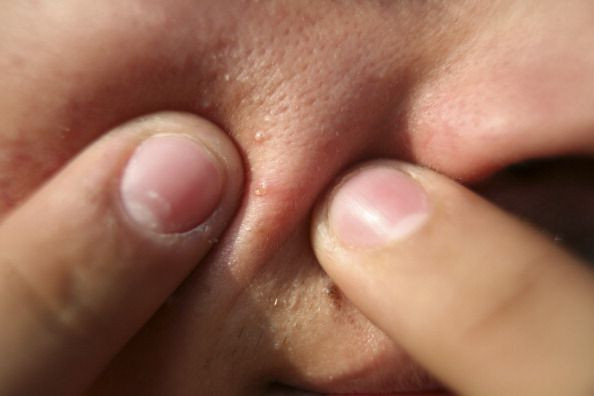Popping Pimples Can Lead To Long-Term Skin Damage: What You Need To Know

White heads, bumps, and unsightly redness are all unwelcome signs of acne. It’s a common misconception that the problematic skin condition is something only teenagers deal with, when in reality, nearly 12 million American adults struggle to get clear skin long after puberty sets in. Popping pimples is tempting at any age, but what exactly happens to your skin?
There are three risk factors for acne: an overproduction of oil, irregular shedding of dead skin, and bacteria build up. Skin is covered by pores, tiny openings in the surface, that allow sweat, hair follicle particles, and the body’s natural oil, called sebum, to pass through. Clogged pores result in pimples, whiteheads, blackheads, nodules, or cysts, depending on the severity of the condition.
Hormones are initially to blame for skin problems, but it lessens as hormone levels stabilize during a person's mid twenties. For those who have been plagued with bad genes, the battle with acne will most likely continue long after adolescence. And for many, simple scrubs and facial cleaners won’t cut it. A more long-term solution is needed.
Popping pimples to try and minimize their appearance may seem like a good idea at the time, but it will likely do the opposite. The pimple contains sebum and bacteria beneath the surface of the skin, so when it’s squeezed, it can irritate the skin and increase the risk of infection. Excess sebum, dead skin cells, and bacteria are inadvertently forced deeper into the follicle, under the surface of the skin, which can cause the wall to rupture and cause infection. While you may get some satisfaction seeing a white head pop out, there is far more that didn’t make it out and gets trapped beneath the surface.
On the other hand, if you can resist the urge to pop a pimple, after about a week, the white contents will settle down into the skin or spontaneously pop when it’s ready. However, larger pimples, such as cysts, may require the help of a dermatologist in order to remove the contents of the pimple safely. This may involve an injection that decreases inflammation within a day or so, and reduces the risk of infection and scarring.
“Acne responds to different types of treatments, depending upon the person’s acne type and possible causes,” said Dr. Cameron Rokhsar, a fellowship-trained dermatologist who provides individualized care for patients with mild to severe acne. “Each person needs a specialized treatment in order to avoid developing hard-to-treat acne scars down the road.”
If irritated and popped, the pimple may leave permanent scars behind on the skin long after they naturally clear away, which could require cosmetic laser surgery to get rid of. Washing your face more, letting acne run its course, and tanning to mask the appearance of pimples may worsen the condition in the end. The key to clear complexion may come down to visiting a dermatologist for a tailored solution for your skin type and age.
Published by Medicaldaily.com



























